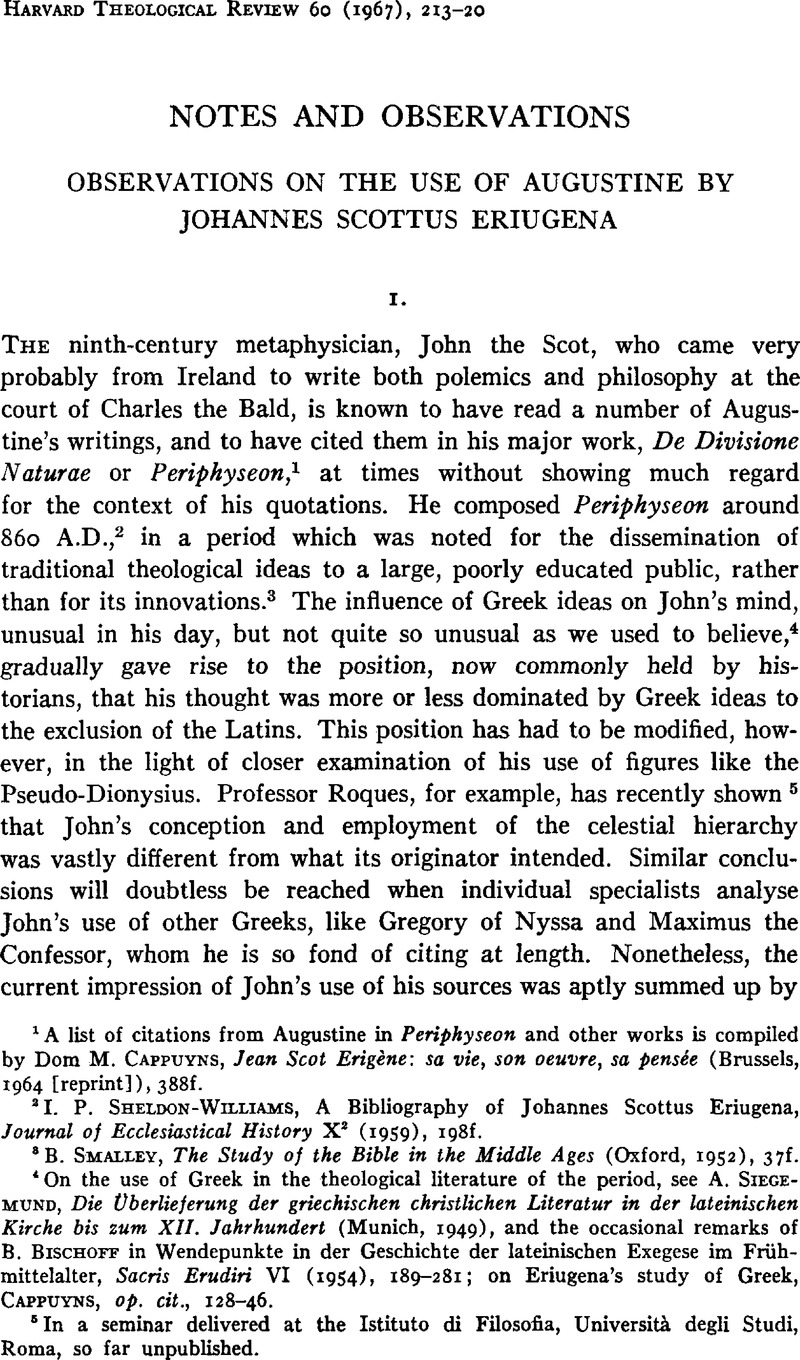No CrossRef data available.
Published online by Cambridge University Press: 10 June 2011

1 A list of citations from Augustine in Periphyseon and other works is compiled by Cappuyns, Dom M., Jean Scot Erigène: sa vie, son oeuvre, sa pensée (Brussels, 1964 [reprint]), 388f.Google Scholar
2 I. P. Sheldon-Williams, A Bibliography of Johannes Scottus Eriugena, Journal of Ecclesiastical History X2 (1959), 198f.
3 Smalley, B., The Study of the Bible in the Middle Ages (Oxford, 1952), 37f.Google Scholar
4 On the use of Greek in the theological literature of the period, see Siegemund, A., Die Überlieferung der griechischen christlichen Literatur in der lateinischen Kirche bis zum XII. Jahrhundert (Munich, 1949)Google Scholar, and the occasional remarks of B. Bischoff in Wendepunkte in der Geschichte der lateinischen Exegese im Frühmittelalter, Sacris Erudiri VI (1954), 189–281; on Eriugena's study of Greek, Cappuyns, op. cit., 128–46.
5 In a seminar delivered at the Istituto di Filosofia, Università degli Studi, Roma, so far unpublished.
6 History of Christian Philosophy in the Middle Ages (New York, 1955), 121.
7 Der Einfluss Augustins in der Theologie und Christologie des VIII. und IX. Jahrhunderts (Halle), 1913.
8 In particular, M. Schmall, Das Fortwirken der augustinischen Trinitäts-psychologie bis zur karolingischen Zeit, Vitae et Veritati: Festgabe für Karl Adam (Düsseldorf, 1956), 54f.; H. Liebeschütz, Texterklärung und Weltdeutung bei Johannes Eriugena, Archiv für Kulturgeschichte 40 (1958), 88f.
9 For a fuller discussion, see my study, The Philosophical Anthropology of Johannes Scottus Eriugena, Studi medievali (1967).
10 Cited in Periphyseon IV, 16; P.L., 122, 814.
11 Periphyseon IV, 14; P.L., 122, 806B–C. Eriugena calls it the twenty-fifth chapter, but one of the annotations of Migne correctly identifies it as the twenty-sixth. Aside from changes in punctuation, and the fact that the citation from Scripture, 1 Tim. 1:5, is not differentiated in the text (lines 12–13), only in the use of “sommus” for “somnus” (line 16) does the text differ from that of C.S.E.L. 48, 449.
12 Translation: In paradise, then, man lived as he wished, so long as he wished what God had commanded. He lived in the enjoyment of God, and he was good through God's goodness. He lived without any want, and he had it in his power to live eternally in this way. He had food that he might not hunger, drink that he might not thirst, and the tree of life that old age might not waste him. There was no corruption in his body; nor was corruption inflicting any disturbances outside his body through any of the senses. He feared neither disease within, nor accident without. His flesh was in the finest health, and his spirits completely peaceful. Just as in paradise there was no summer or winter, in its occupant there was no disruption of good will through lust or fear. There was no sadness of any kind, nor any foolish joy. True gladness flowed from the presence of God, who was loved “out of a pure heart, and a good conscience, and a faith unfeigned.” A faithful unity bred of honest love served as a bond between them, a wakeful harmony of body and soul; and the commandment was kept without labour. No languor made his leisure wearisome; nor did sleep oppress him against his will. God forbid we suspect that, with such facility of things and felicity in the mortals, man would not have been able to be reproduced without the disease of lust Those (reproductive) members were moved by him, as all the rest, through an act of volition. Without the seductive stimulus of heat, with tranquillity of mind and of body, with no corruption of (her) virginity, the husband would have impregnated the lap of the wife.
13 On this subject, see Ladner, G. B., The Idea of Reform (Cambridge, Mass., 1959), 443–48CrossRefGoogle Scholar, and the interesting reflections in Kantorowicz, H., The King's Two Bodies (Princeton, 1957), 175–284.Google Scholar
14 See Hoffmann, E., Platonism in Augustine's Philosophy of History, Philosophy and History: Essays presented to Ernst Cassirer, ed. Paton, H. J. and Klibansky, R. (Oxford, 1936), 173–77.Google Scholar
15 By theophany Eriugena intends “visibilium et invisibilium species, quarum ordine et pulchritudine cognoscitur Deus esse ….” (P.L., 122, 919C).
16 This summary is based upon Eriugena's final position, the commentary on Gregory's De Hominis Opificio, Periphyseon IV, 16; P.L., 122, 819D–821D, and on Eriugena's own recapitulation in Book IV, 17; ibid., 829f.
17 I have analysed the argument in some detail in my article, Part II, section 3.
18 Ending roughly at Periphyseon IV, 16; P.L., 122, 816D.
19 Ending at 818A.